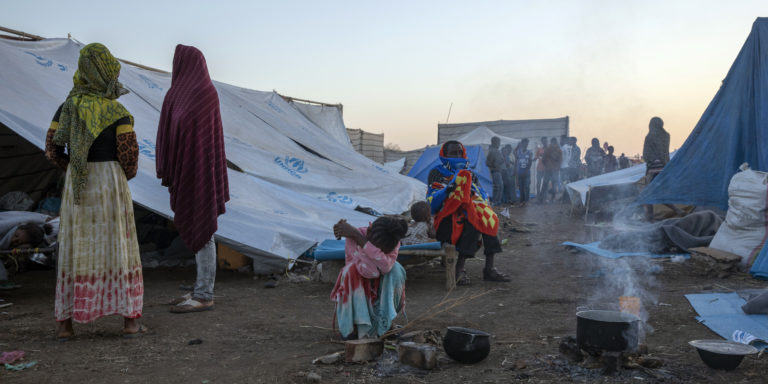INTELBRIEF
December 4, 2020
IntelBrief: The Crisis in Ethiopia Continues

Bottom Line Up Front
- The civil war in Ethiopia has been raging for nearly a month, as the humanitarian situation continues to deteriorate in the Tigray region.
- Ethiopian ground troops, backed by airpower, have pushed forward their offensive, even as TPLF rebels prepare for a guerilla-style insurgency.
- If the conflict intensifies, it will have destabilizing effects beyond Ethiopia that could spill over into the broader East Africa region.
- In an effort to end the conflict, the African Union has appointed several mediators, including Ellen Johnson Sirleaf, Joaquim Chissano, and Kgalema Motlanthe.
The civil war in Ethiopia has been raging for nearly a month, as the humanitarian situation continues to deteriorate. The United Nations Refugee Agency (UNHCR) recently warned of an emergency, with as many as 100,000 Eritrean refugees in northern Ethiopia unable to secure access to food. Hundreds of thousands of vulnerable civilians in the region are regularly dependent on food aid. The Ethiopian government compounded the challenges by cutting off all access to humanitarian aid and communications inside the restive Tigray region. Just this week, Ethiopia and the United Nations announced a tentative deal to allow aid to begin flowing into Tigray. More than 46,000 civilians have already fled the border into Sudan, where humanitarian aid organizations are struggling to deal with the influx of refugees. Sudan is grappling with its own challenges as it seeks to move beyond decades of strongman rule under Omar al-Bashir to a transitional government based in Khartoum.
Ethiopian Prime Minister Abiy Ahmed recently announced that Ethiopian troops secured control of Mekele, Tigray’s capital, in its ongoing struggle against the Tigray People’s Liberation Front (TPLF). Ethiopian ground troops, backed by airpower, have pushed forward their offensive, even as TPLF rebels moved into defensive positions and are preparing for a guerilla-style insurgency. As artillery strikes rained down on Mekele, Ahmed claimed that his troops stood on the precipice of victory, although this claim could not be independently verified, and many suspect this claim could be premature. It remains challenging to glean accurate reporting from Tigray, especially after Prime Minister Ahmed declared a six-month state of emergency and subsequently cut off access to the internet and other parts of the region’s telecommunications network. TPLF leadership has vowed to wage an enduring insurgency, signaling the prospects of a long and bloody fight against a heavily armed and battle-tested adversary. The TPLF’s leader Debretsion Gebremichael reaffirmed that the group was fighting for ‘self-determination and self-rule.’ The conflict began in earnest in early November after TPLF fighters attacked an Ethiopian National Defense Force base in northern Ethiopia.
Leadership in the Tigray has accused the government in Addis Ababa of seeking to wage a campaign of genocide. Estimates of civilian casualties range from several hundred to more than one thousand, with concerns growing about the Ethiopian military’s advance into Mekele, where 500,000 civilians currently live. International aid organizations, including the UN Office for the Coordination of Humanitarian Affairs (OCHA) and the International Committee of the Red Cross (ICRC), have both attempted to highlight the sense of urgency in challenges facing the civilian population in the region, including a lack of basic medical equipment. If the conflict intensifies, it will have destabilizing effects beyond Ethiopia that could spill over into the broader region. The TPLF has already been accused of firing rockets into neighboring Eritrea, sparking fears of a regional conflagration that could draw in other countries, including Eritrea or Sudan.
Tigrayans constitute approximately 6% of Ethiopia’s overall population (109.2 million) and have long held prominent positions within the government, military, and other leading sectors. However, since Prime Minister Ahmed assumed power in 2018, Tigrayans complain that they have been increasingly marginalized. In September of this year, Tigray moved forward with parliamentary elections even though the federal government had announced their postponement due to the COVID-19 pandemic. As a result, the government suspended funding to the region, sparking the current spiral of events. In an effort to end the conflict, the African Union (AU) has appointed several mediators, including: Ellen Johnson Sirleaf, the former president of Liberia; Joaquim Chissano, the former president of Mozambique; and Kgalema Motlanthe, the former president of South Africa. Prime Minister Ahmed, who won the Nobel Peace Prize in 2019 for his efforts to resolve Ethiopia’s longstanding conflict with neighboring Eritrea, now has another opportunity to play peacemaker, only this time within his own country. As 2020 comes to a close, Ahmed has a critical opportunity to move toward ending the current crisis through diplomacy and negotiation. If he insists on pursuing purely military solutions, Ethiopia could be entering a period of insurgency that has the potential to drag on for years.